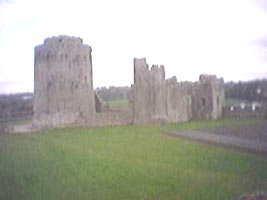

Pembroke occupies a strategic position, sited on a high ridge between two tidal inlets
and on a major route to Ireland, and was chosen by the first Norman invaders into
south-west Wales. The first castle, of earth-and-timber, was built by Roger of
Montgomery in 1093, and it held out against Welsh attacks in subsequent years.
The Normans, under Stronbow, embarked for their Irish campaigns from Pembroke. Then in
1189 the castle came into the control of William Marshall, who turned it into a massive
stone fortress.
First to be built was the inner ward with its magnificent round keep, over 70 feet high with a remarkable domed roof. This central keep dominates the countryside, and is the largest in Wales. Pembroke is big by castle standards, and massive in terms of its walls and towers.
Enclosing the keep was the inner curtain wall with a large horseshoe-shaped gate.
Only a thin wall was required along
the cliff edge.
Much of the building work in the outer ward is probably also the work of William
Marshall. A series of round towers, the
north-east bastion and a massive gatehouse on the south completed the defences of
the outer ward..
The castle then passed to the de Valence family, followed by the Hastings family who
held it from 1324 to 1389. Pembroke then passed to the English Crown.. The Crown granted
out a series of short-term tenancies, and the castle fell into
considerable disrepair.
In 1405 Francis Court was hastily given munitions to hold the castle against Owain
Glyndwr's uprising. The castle
later passed into the hands of Jasper Tewdwr, earl of Pembroke, and was (apparently) the
birthplace of his nephew Henry in 1457, later King Henry VII.
Pembroke supported Parliament at the beginning of the Civil War, but in 1648 the
town's mayor, John Poyer, changed sides and. Cromwell himself came to besiege the
castle which only fell after seven weeks bombardment by cannon. As was his custom,
Cromwell blew up the barbican and the fronts of all the towers to prevent the castle ever
again being used militarily.
The town of Pembroke still retains small sections of its defences, and one can follow
large sections of the town wall
| Wales Calling Wales Calling front page |  |
|
| . | ||
| We have great hotels in Wales hotels in Wales |  |
Land of mountains - Wales